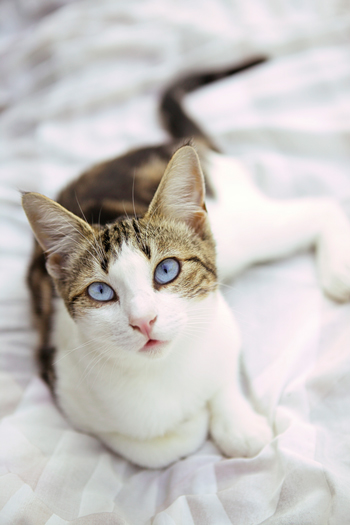

Thomas D. Scavelli, DVM, Diplomate ACVS
Thyroid Disease in Cats – What is Hyperthyroidism?
Feline hyperthyroidism is a disorder resulting from excessive thyroid hormone. The disease occurs in middle to older aged cats without sex or breed predilection. Though functional benign enlargement (adenoma) is most common (98%), thyroid carcinoma (cancer) is another cause (2%). The cat’s thyroid gland has two lobes – about 70% of cats have both lobes affected.
Symptoms
May include – weight loss, poor haircoat, rapid heart rate, voracious appetite or thirst, anxiety or nervousness, diarrhea or vomiting.
Diagnosis
Lump or mass in the neck detected on a physical exam; elevated levels of thyroid hormone in the blood; isotope imaging test that shows the size, shape and location of the thyroid glands.
Treatment
There are four options – anti-thyroid medication, restricted iodine diet, surgery, or radioiodine therapy.
Our veterinarians are fully qualified to treat cats diagnosed with feline hyperthyroidism. We can suggest the best treatment for your cat and help you manage the problem. We have extensive experience with medical, surgical and radioiodine treatments. At GSVS, we have been treating cats with radioactive iodine since 2001. At the present time, we have treated approximately 3,000 cats with this disorder.
Frequently Asked Questions
Q) My cat is on Tapazole, can she still be given radioiodine?
A) Cats need to be off any anti-thyroid drug for approximately one week before receiving I-131. This is recommended to maximize radioiodine absorption.
Q) My cat is 17, can she stand the hospitalization?
A) Yes, while disconcerting, cats quickly adjust especially after they are no longer hyperthyroid. Cats as old as 21 have been successfully treated.
Q) Can I visit?
A) No, this is not permitted due to concerns regarding radiation exposure to the family in the initial 72 hour period. You may leave blankets, toys or special diets for your cat.
Q) Are some cats not able to receive radioiodine?
A) Yes, some cats have other underlying medical issues that recommend against the use of radioiodine. These patients are determined at the time of the initial consultation appointment
Q) What happens if my cat becomes critically ill while hospitalized for radioiodine therapy?
A) Full care is given with special arrangements made to minimize radiation exposures. No needed treatment is denied.
Treatment Options
Medical Treatment
Anti-thyroid drugs inhibit the production of thyroxine by blocking the biochemical reactions that produce the hormone. These drugs are usually effective but may be needed for a lifetime. As with any drug, there can be reactions. These include loss of appetite, vomiting, depression, bleeding tendencies, skin rashes, facial swelling and itching. Pills are given two or three times a day. Periodic checkups are needed to check hormone levels and adjust the dosage.
Surgical Treatment
Removal of the thyroid gland is a relatively straightforward surgical procedure with a good success rate. There are added risks because general anesthesia is needed and older cats may have heart, kidney or other problems that cause complications. Loss of the parathyroid gland can cause disorders of calcium metabolism.
Radioiodine Treatment
Radioactive Iodine-131
While this is the preferred treatment for people with the same disease, the availability of radioiodine for cats is limited to specialty hospitals with strict radioisotope permits. We are pleased to offer this treatment option at GSVS. Radioiodine is safe and effective with cure rates of approximately 95-98% with one treatment. Cats can receive a second treatment if necessary. This treatment avoids surgery, anesthesia, and anti-thyroid drugs. The major disadvantage is required hospitalization until most of the radioactivity dissipates. A single injection is given (under the skin, like a vaccine) and the radioactive iodine is quickly absorbed into the bloodstream. The iodine is taken into the thyroid gland and incorporated into thyroxine. The majority of cats have normal hormone levels within a week or two of treatment. Hospitalization is required under the radioisotope permit issued by the NRC (Nuclear Regulatory Commission). You can expect hospitalization for a period of 96 hours. There will be additional minor precautions after discharge but they are not difficult and will be thoroughly explained to you.
Pre-Treatment Protocol
- All cats should be off Tapazole for approximately 7 days
- Requested data base prior to referral: complete blood screen, chest radiographs, urinalysis and serum T4 levels (within 2 weeks of consultation at GSVS)
Treatment Protocol
- Evaluation of pre-treatment bloodwork, thoracic radiography and urinalysis
- One time injection; dosage based upon clinical symptoms, tumor size and serum T4 levels
- Adenomatous tissue of the thyroid gland is destroyed by the Beta radiation released from the radioactive iodine
- Cats are examined daily for health analysis and radiation monitoring
- Cats are sent home once they reach a safe and legal level of radiation release (96 hours)
Prognosis
Cats with severe disease involving many organ systems may not survive. However, most cats, even teenagers, respond very well to treatment. The majority of patients need no additional thyroid supplementation or further treatment for hyperthyroidism. In fact, less than 2% of cats treated with radioactive iodine remain hyperthyroid and require repeat treatment.
Cost of Treatment Includes:
- Initial consultation fee
- Evaluation of referral data base
- 96 hours hospitalization
- Radioactive iodine medication
- Daily monitoring by specialists and nursing staff
